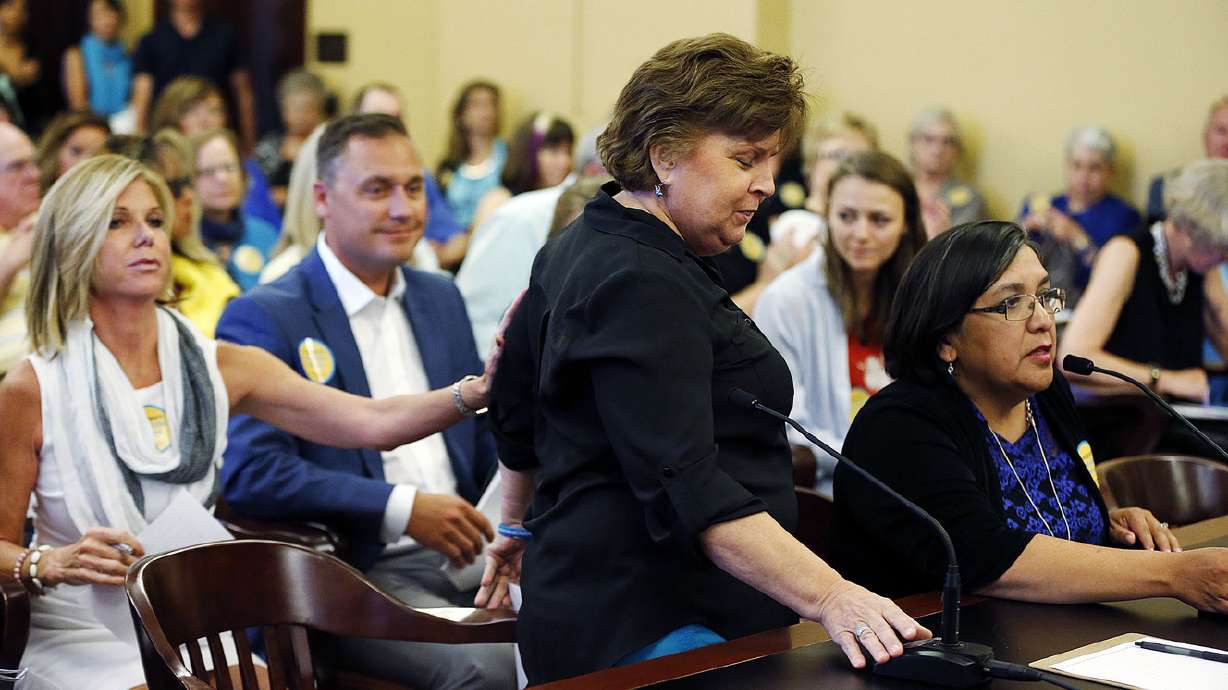Estimated read time: 4-5 minutes
This archived news story is available only for your personal, non-commercial use. Information in the story may be outdated or superseded by additional information. Reading or replaying the story in its archived form does not constitute a republication of the story.
SALT LAKE CITY — Utah lawmakers continued to grapple with the ethical and legal implications of end-of-life care, the so-called "death with dignity" legislation that has been debated for years and Wednesday was heard again before a packed interim committee meeting on Capitol Hill.
This will mark the third year in a row that Rep. Rebecca Chavez-Houck, D-Salt Lake, has tried to pass legislation that would allow terminally ill patients to end their lives with drugs prescribed by a physician.
The proposal was put on hold and sent to interim committee for study last year and the year before, when it was called the Utah Death With Dignity Act. And Wednesday it drew the support of suffering medical patients, but sharp questioning and concern from others.
Patient Carrie Snyder, flanked by her family, testified in favor of the proposal.
In the two years since her stage IV terminal cancer diagnosis, "I have taken every pill and pushed every medicine prescribed to me through my being," Snyder said. "I did it because I want to live. I have made choices — really difficult ones — in order to keep living."
She then added: "As Utah's end-of-life choices currently stand, I will be lost to starvation, dehydration and morphine," Snyder said.
She pleaded with lawmakers to consider "that there can be another way for the end of life to look — one that looks more humane to many of us."
To those “worried about me missing out on the beautification of suffering," she said, "I am the only one who can say when my spirit is free. And I have suffered enough."
Five states — Oregon, Washington, Montana, Vermont and California — have end of life laws that allow patients to make a determination on ending their lives.
Chavez-Houck's proposal, modeled largely after Oregon's law, requires that patients be mentally competent adults with an "irreversible and incurable illness that will result in the patient's death in six months or less."
Two physicians would have to confirm the prognosis and patients must be counseled on "all feasible alternative treatment options," according to the bill.
The patient must be also able to self-administer the drug. No one else, including doctors or family members, can assist.
Officials from the Sutherland Institute and the Catholic Diocese of Salt Lake City spoke against the legislation, expressing fear that patients could be coerced or encouraged to take their lives prematurely.
Margaret Dore, an attorney from Washington and president of Choice Is An Illusion, warned legislators that end-of-life legislation may increase the likelihood of abuse of vulnerable patients by physicians or family members.
"I don't see how you can enforce any of these safeguards," Dore said.
Physicians who write prescriptions for life-ending drugs under the bill would "have good faith immunity," Dore said. "So as long as you meant to do it right, it's OK."
Dr. Catherine Stokes, a pediatrician with Intermountain Healthcare, cited stories about people who were given terminal prognoses but remained alive for years.
She also warned that mental health professionals may not be prepared to evaluate patients’ competence on short notice.
"With an assisted suicide, there's no way to correct a mistake," Stokes said.
But Margaret Battin, a professor of philosophy and medical ethics at the University of Utah, argued that the term ‘assisted suicide’ is inaccurate and “defames people who reasonably, reflectively seek a peaceful death.”
“They’re not choosing to die,” Battin said. “They’re already dying.”
She skirmished with Rep. Norman Thurston, R-Provo, who offered the example of a “lovesick teenager” ending his or her life.
"You're saying that that would be wrong, but it's not wrong for a person who has a terminal illness," Thurston asked. "I fail to see that ethical difference."
"What this bill permits doesn't count as suicide," Battin responded. “It doesn't count legally as suicide."
"Is it wrong?" Thurston asked.
"I think it is not wrong," Battin responded.
"But a lovesick teenager taking their life is wrong?" he said.
"I think that's right," Battin said.
Patient Janet LeMaire argued that people deserve to have control over their final hours.
LeMaire, who was given one year to live after stage IV colon cancer spread to her internal organs, said her husband and children support her wishes.
"I have not been in control of my situation since I was diagnosed," LeMaire said. "At what point has someone suffered enough? Waiting to die naturally would not justify my suffering at the end."
"I would say goodbye to my loved ones, talk about the good times, the funny stories," she added. "I want them to know I was happy at the end and that this was my choice."
According to a Utah Policy survey, 63 percent of Utahns strongly or somewhat favor a law that would give a terminally ill person, as verified by two doctors, the right to choose to die.
Thirty percent said they strongly or somewhat opposed the law.
Just 6 percent said they did not know.
The controversial legislation has many different names, including right-to-die, physician-assisted suicide or end-of-life legislation. Email: dchen@deseretnews.com Twitter: DaphneChen_









